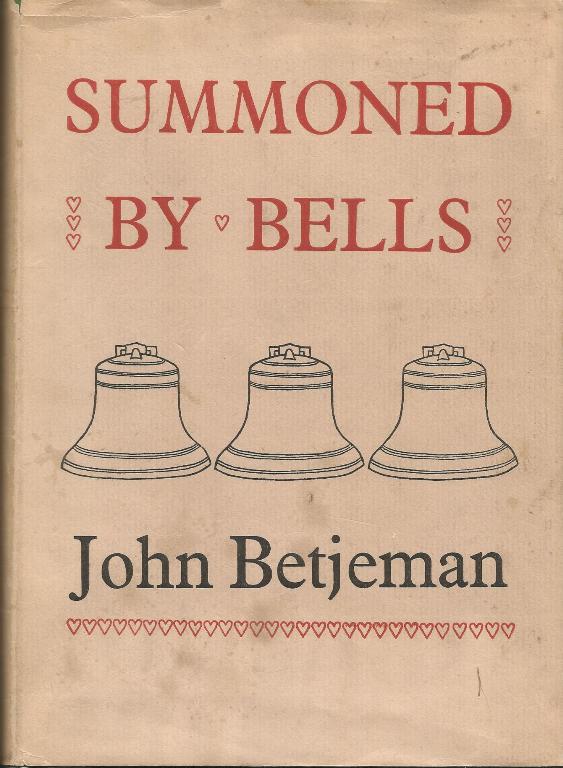Inspiring Older Readers
 posted on 29 Oct 2019
posted on 29 Oct 2019
Summoned By Bells by John Betjeman
To a lot of people it might seem odd that I feel I’m confessing to something a little bit sinful by saying that I’ve got a soft spot for John Betjeman and his poetry. But the truth is that I grew up with the received opinion that Betjeman was a light-weight versifier and not a real poet – just a step up from the dreadful Pam Ayers. His seductive rhyming poetry, easy domestic metaphors and his vulnerable, cuddly persona – a sort of permanently disappointed middle class teddy bear – gave him a popularity with readers that more ‘difficult’ contemporaries could only dream of. To the circles I moved in, all of this was confirmation that he wasn’t serious enough to be worth reading.
He was the Poet Laureate for twelve years from 1972 until his death in 1984, a founder member of the Victorian Society and a passionate campaigner for Victorian architecture at a time when these buildings were at their least popular and were being swept away in many towns and cities. ‘Betjemanesque’ was a word coined to encapsulate a world view and seemed to articulate the cultural embodiment of an essentially C(c)onservative, suburbanite elite.
Of course, these lazy, easy assessments are always dangerously two-dimensional and inevitably Betjeman was a much more complex character and much more skilful poet than this jaundiced perception allows for. I think it’s fair to say that since his death his stocks as a poet have gone up rather than down and this is neatly captured by Hugo Williams in a piece he wrote for The Guardian back in 2006:
“John Betjeman makes most modern poets look either desperately amateurish or desperately professional. A combination of happy childhood, miserable schooldays and Oxford in the 1920s gave him a pretty balanced view of who he was and what he could do and he never lost sight of this. If you haven't read him before, you're taken aback by how good he is. A festive, holiday atmosphere hangs over his work: no wonder nobody mentioned him at school. Like any writer you discover for yourself, he becomes a covert favourite, one whose name you are inclined to drop into conversations, sounding out the company. At home, you keep him on that special shelf near your chair. And this may be the secret of his success - reading him is an act of mild anarchy. It's worth remembering that Philip Larkin kept Betjeman on his own special shelf, alongside Hardy, Lawrence and Christina Rossetti.”
My way into Betjeman’s verse came via his extended autobiographical blank verse poem, Summoned By Bells. The focus is on the development of the young Betjeman and covers his childhood, early school experiences and his final years at university. The book ends with him characteristically stumbling into the adult world of work.
All the things you might expect are there: the comfortable, often cosy, middle class childhood where tangible emotions and physical experiences, smells and tastes, are cunningly conjured off the page:
“Childhood is measured out by sounds and smells
And sights before the dark of reason grows.”
And Betjeman’s own constant desire to be liked and included is always at the forefront of his mind. Much of the content deals with coming to terms with the fact that he almost always felt he was an outsider – almost a victim – and that his dearest wish, to be liked and well-regarded, was always being thwarted.
That Betjeman was a sensitive boy and young man is evident. He imbues almost everything with an emotional weight it struggles to support and it’s easy to see where his slightly hangdog adult persona came from.
A memoir written in blank verse might not sound like something people would rush to but this is where Betjeman’s understated poetical skills come to the fore – this is an astonishingly enjoyable read and 115 pages fly past with ease.
While Betjeman throws back the curtain on his feelings about his youth, he’s not an analyst. He’s prepared to set out his feelings for us but he’s not one to follow his feelings down the rabbit hole. His failsafe when confronted with high emotion is to reject elevated speculation and turn back to the detail of everyday life – the forum he’s always most comfortable with. This is a characteristic spotted by Philip Larkin who said:
(Betjeman) "is not an egoist: rather, he is that rare thing, an extrovert sensitive. . . . [Time] and again in scenes where interest might be expected to focus on the author's feelings we find it instead shifting to the details…. Betjeman has an astonishing command of detail, both visual and circumstantial."
Above all, however, I came out of reading this book with a respect and liking for Betjeman that led me to put aside my earlier prejudices about him and to read more of his poetry. Perhaps just as importantly I now think he’s a man who I might have liked to meet.
Terry Potter
October 2019